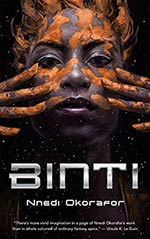
![]() Nymeria
Nymeria
1/24/2017
![]()
Binti is a very peculiar story, one that seems to start as journey of discovery, only to turn into something completely different; the kind of story that carries several layers of meaning, yielding them one by one only as you keep thinking about it. It's not what I would call an immediate story, but rather one that gains flavor and depth with time, not unlike a fine wine.
The main character, the titular Binti, is a young woman living in Namibia and belonging to the Himba tribe, a small ethnic group dwelling in voluntary seclusion from the rest of the world, a world very technologically advanced where space travel is easily accessible and Earth has come into contact with a variety of alien cultures. The Himba, and Binti's family in particular, have specialized in providing refined technological gadgets, but they prefer to keep contact with the outside world to the minimum, relying mostly on strict observance of tradition and cultural heritage and a general distrust of outsiders. As Binti says at some point:
My tribe is obsessed with innovation and technology, but it is small, private, and, as I said, we don't like to leave Earth. We prefer to explore the universe by traveling inward, as opposed to outward.
When Binti gains admission to the prestigious Oomza University through her exceptional mathematical skills, her family and the whole village do their utmost to discourage her from that path, stressing the need to keep close to her own roots and not betray them. Her quest for knowledge cannot be denied, though, so Binti leaves overnight to take the ship for Oomza, but once she sets foot in the spaceport, her family's warnings about outsiders appear to be all too true: the Khoush, who seem to be the dominant (globalized?) population, look at her with open, blatant curiosity, commenting about her appearance, manner of dress and the ritual clay covering for her skin and hair. It's a jarring scene, one that should have no place in a futuristic--and hopefully more evolved--world: Binti is observed like a strange specimen, touched and inspected as if she were not another human being but a thing, not possessed of feelings or a soul. The very fact of her difference is enough for these people to wonder at her non-conformity and to criticize it, at the same time robbing her of the status of person.
Here comes however the first inkling about Binti's character: where others would have been offended by the incident, or ashamed of their heritage, she calmly explains the differences trying to bridge the gap in knowledge (and manners!) with her serene composure. This attitude will serve her even better once she boards the ship and starts making friends with her fellow students, the common thirst for learning creating a bond that transcends cultural distinctions. This is where an abrupt change in narrative course plunges Binti's journey into tragedy, the very suddenness of it a jolt that requires some time to be metabolized: the young woman finds herself alone on the ship--that is, except for the alien Meduse, whose grudge against humans brought them to commit an act of brutality.
In this moment, through her loneliness and terror, Binti's role in the story comes to the fore: she is meant to be a bridge between two clashing civilizations, the ambassador that will help them cross the chasm of misunderstanding and hate, because she is the one who knows the value of cultural symbols, of precious heritage, and she will be instrumental in mending the rift created by human ignorance. There is a sort of poetic justice in this: the young woman who was disowned by her own clan for having left her home in search of knowledge, and scorned by more "modern" people for her attachment to tradition, is the only one who can comprehend two different worlds and bring them closer toward mutual understanding.
Still, such an accomplishments - the personal the public one - are not without a price: Binti comes from a cultural milieu where change is viewed with suspect, and the experience she went through has changed her in many ways - mental, psychological and even physical - and the realization that she is now far from her own roots in a way that has less to do with actual distance and more with frame of mind, leaves her somewhat adrift and afraid, more afraid than she was at the beginning of her journey.
The resolution of the story is, in my opinion, its only point of weakness because it feels too easy, too short - or maybe it's just because I wanted more: Binti is such a fascinating character that I think she should have deserved a whole novel, and her path should have had more room to expand and to delve deeper into her experiences. Still, this remains a fascinating story, and it reinforced my need to explore this author's longer works to discover more of her amazingly different themes.
http://spaceandsorcery.wordpress.com